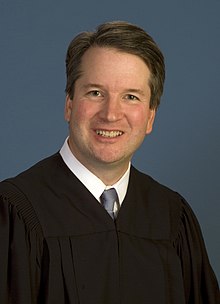
Brett Kavanaugh
In a longish analysis of Brett Kavanaugh 's thinking Fordham Law historian Jed Shugerman explores the Supreme Court nominee's thinking on the unitary executive theory of untrammeled executive power. When confirmed Kavanaugh will be not only the fifth Catholic but the fifth unitarian on the high court.
Jed gives the judge more credit for good faith than I do. His aggressive stance in the Clinton impeachment investigation - largely drafting the Starr report - contrasts with his 1998 view (after service in the Bush 43 administration) that Congress should pass a law restricting ability to indict (and thereby disrupt the work of) the President.
But that to me looks like a switch in time, realigning him as the defender of the executive which he once worked powerfully to obstruct. When the issue comes before the Supreme Court my money is heavily on Kavanaugh will find that the disruptive effect of indicting the President supports the view that impeachment is the exclusive remedy so long as a president serves in office. - gwc
The Wolves in Kavanaugh’s Footnotes – SHUGERBLOG
by Jed Shugerman (Fordham Law School)
If you’re concerned that Judge Kavanaugh has an extreme view of presidential power, you’re not going to find proof in his overhyped 2009 Minnesota Law Review article. But you might find it in his injudicious judicial footnotes.
***
And coincidentally, in a constitutional question that could go in different directions, Kavanaugh again happens to side with executive power. There is a pattern here: a preference for executive power, even if lacks clear support by the historical context of the Founding. And he also shows a remarkable preference for Scalia dissents and concurrences, even if they conflict with precedents and historical evidence.
Interestingly, Kavanaugh cited a particularly colorful passage from Scalia’s Morrison dissent a few times. The full passage:
Frequently an issue of this sort will come before the Court clad, so to speak, in sheep’s clothing: the potential of the asserted principle to effect important change in the equilibrium of power is not immediately evident, and must be discerned by a careful and perceptive analysis. But this wolf comes as a wolf.
Kavanaugh doesn’t come as a wolf, and I frankly don’t know if he’s a wolf (by that I mean an extremist judge who disregards precedent and will overturn decades of settled practices and institutions). On the one hand, there is plenty of extremely qualified moderate-conservative clothing (his ACA conclusion in Seven-Sky, his mainstream Minnesota Law Review piece, his defense of criminal defendants in U.S. v. Burwell).
On the other hand, he puts a lot of wolves in his citations and footnotes. To mix classic Scalia metaphors, he puts wolves in mouseholes. I’m not sure what to make of this record. I am obviously not suggesting that he is unqualified, nor that he recuse from any future cases, but I am asking questions directly from his opinions about some of his blindspots and his potentially extreme positions. These signs — about Kavanaugh’s reliance on Scalia’s flawed dissents and concurrences, his flawed historical assumptions that somehow point him in favor broad executive power, and what these signs portend — deserve candid, good faith questioning in confirmation hearings. And these questions deserves candid and complete answers.
No comments:
Post a Comment